 |
 |
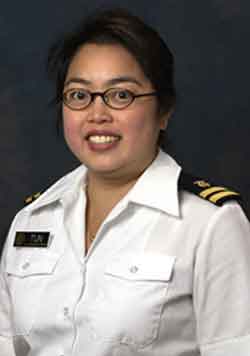
|
|
W. Tun, Ph.D., Epidemiologist, Epidemic Intelligence Service (EIS) Officer, Division of Sexually Transmitted Disease (STD) Prevention, Centers for Disease Control and Prevention (CDC), Atlanta, Georgia
|
1. I chose this career because...
2. My typical workday involves...
3. What I like best/least about my work...
4. My career goal is...
5. When I'm not working, I like to...
|
|
1. I chose this career because...
|
Back to Top

|
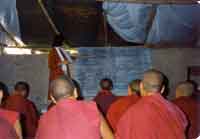
|
|
W. Tun teaches English to Tibetan regugee nuns in Dharamsala, India, in 1993.
|
I chose to become an epidemiologist because I have always been interested in international development. After graduating from college, I spent a year as a volunteer in India teaching English to Tibetan refugees. This experience influenced my decision to focus on public health problems in developing countries. I was also drawn to the field because of the growing HIV/AIDS epidemic in Southeast Asia, particularly in Burma where I was born and still have strong ties.
Within the field of public health, I chose epidemiology because it allows me to combine my strength in math and analysis with my interest in addressing social problems. Epidemiology is fascinating because it examines how the occurrences of diseases are impacted by diverse factors, from microbial and physiological, to environmental and behavioral. I briefly considered a career in clinical medicine. Ultimately, I found public health more appealing because of its ability to impact whole communities simultaneously, rather than a single patient at a time. It was a perfect career choice for me.
(You can learn more about Epidemic Intelligence Service (EIS), and read about other EIS officers at CDC’s Web site http://www.cdc.gov/eis/.)
Education
- Bachelor of Arts, Math, Haverford College, Haverford, Pennsylvania
- Master of Health Sciences, Epidemiology, Johns Hopkins School of Public Health, Baltimore, Maryland
- Doctor of Philosophy, Epidemiology, Johns Hopkins School of Public Health, Baltimore, Maryland
|
|
2. My typical workday involves...
|
Back to Top

|
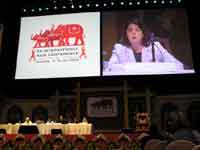
|
|
W. Tun gives a presentation on HIV Treatment Optimism at the International AIDS Conference in Bankok, Thailand (2004).
|
My typical workday involves the work I do for the Health Services Research and Evaluation Branch in the Division of Sexually Transmitted Disease Prevention at the Centers for Disease Control and Prevention (CDC). The majority of my time is devoted to conducting research on the epidemiology of sexually transmitted diseases (STD) along with the quality of patient care, and evaluating STD prevention interventions.
My Duties:
- Writing protocols for research or evaluations - I recently wrote a protocol to evaluate an intervention used at the San Francisco STD clinic to help control the syphilis outbreak in gay/bi-sexual men.
- Developing research instruments, such as surveys, data collection forms, and electronic databases – In one study, I developed a questionnaire to examine the changes in sexual and drug-injection behaviors of illicit drug users.
- Collecting data (conducting interviews or administering surveys) - For the San Francisco project, data collection involved interviewing clinicians and conducting focus groups with gay/bi-sexual men. As you advance in the field, data collection becomes a minimal part of your time.
- Analyzing data - Data analysis may be qualitative or quantitative using specialized computer software. It’s a great joy when you reach this stage.
- Writing reports of program evaluations for stakeholders (i.e., health departments, Ministry of Health, US Agency for International Development) - The San Francisco STD clinic implemented some of the recommendations we made based on our intervention evaluation.
- Writing manuscripts of research results for publication - I am currently writing an article for the CDC’s publication, Morbidity and Mortality Weekly Reports, on the status and importance of screening for Chlamydia by clinicians.
- Presenting research findings at conferences - I recently gave a presentation on one of my areas of expertise, HIV treatment optimism and its effects on risk behaviors, at the International AIDS Conference in Bangkok.
Answering the Call to Public Service
While the majority of my time is devoted to STD-related projects, as an Epidemic Intelligence Service Officer, I am expected to assist in other ways during public health crises. For example, during the Severe Acute Respiratory Syndrome (SARS) outbreak, I assisted in surveillance activities at CDC’s Emergency Operations Center. Additionally, at the peak of the West Nile Virus outbreak, I was involved with a research study to identify risk factors for West Nile Virus infection in Mississippi.
|
|
3. What I like best/least about my work...
|
Back to Top

|
What I like best about my work is working with different populations and learning about their culture, whether these populations are in the U.S. or in other countries. Some of these populations include injection drug users in Baltimore, gay/bi-sexual men in San Francisco, communities affected by West Nile Virus in Mississippi, Burmese migrant workers and refugees in Thailand, and healthcare providers in Russia.
One of the greatest rewards of my job is having an impact on public health programs and policies. I enjoy that, ultimately, my work will help to improve public health. For example, after evaluating the program in San Francisco, it was extremely rewarding to see my recommendations being implemented to improve their program to control syphilis.
What I like least about my work as a public health representative is that I must always communicate in a way that educates, informs, and is sensitive to the needs of the public. This is always a challenge for me, particularly in a field that deals with sexual behaviors.
|
|
4. My career goal is...
|
Back to Top

|
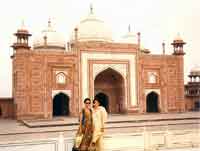
|
|
W. Tun and her sister visit the Taj Mahal in India in 1994.
|
My career goal is to continue doing applied epidemiology (i.e., solving real-world problems in the real-world setting, rather than conducting research studies). Soon I will be transitioning into another area of public health. However, I will continue to use my skills in epidemiology. I will be working with the Evaluation, Surveillance & Research group at Family Health International (FHI). This will involve monitoring and evaluating FHI’s HIV programs overseas. I will be based in their Arlington, VA office and spend about 25-40% traveling. I am looking forward to this work because it will allow me to do applied epidemiology. This is an especially exciting time to do evaluations of HIV programs. There is much interest in expanding these programs in Africa to ensure that more HIV-infected people have access to treatments.
My interest is to continue working to improve the health of under-served populations, whether they are inner-city kids in Baltimore or HIV-infected adults in Africa. Some day, I hope to have the opportunity to work in Burma with the growing HIV/AIDS epidemic.
|
|
5. When I'm not working, I like to...
|
Back to Top

|
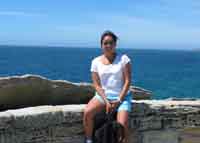
|
|
W. Tun taking a coastal hike on vacation in Australia in 2003.
|
When I’m not working, I like to work creatively with my hands. I love making pottery, knitting, candle making, cooking, and anything that allows me to exercise a different part of my brain. I also love doing something physical, like hiking, playing tennis and volleyball, and practicing yoga. This is particularly important since the majority of my day involves sitting in front of a computer. The moments I treasure most are the ones I spend with my family and friends, usually while enjoying a wonderful meal. My career is important to me, but never at the expense of my relationships with my friends and family.
|
|
|
|
 |